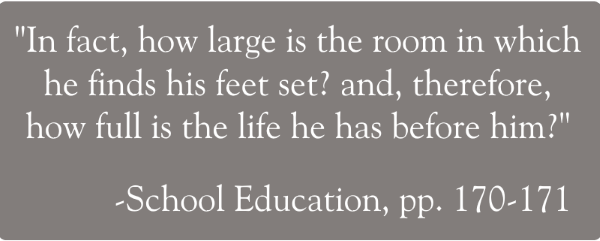
Listen Now:
“The success of such a school demands rare qualities in the teacher––high culture, some knowledge of psychology and of the art of education; intense sympathy with the children, much tact, much common sense, much common information, much ‘joyousness of nature,’ and much governing power…” (Vol. 1, p. 178)
“Our aim in Education is to give a Full Life.––We begin to see what we want. Children make large demands upon us. We owe it to them to initiate an immense number of interests. Thou hast set my feet in a large room; should be the glad cry of every intelligent soul. Life should be all living, and not merely a tedious passing of time; not all doing or all feeling or all thinking––the strain would be too great––but, all living; that is to say, we should be in touch wherever we go, whatever we hear, whatever we see, with some manner of vital interest. We cannot give the children these interests; we prefer that they should never say they have learned botany or conchology, geology or astronomy. The question is not,––how much does the youth know? when he has finished his education––but how much does he care? and about how many orders of things does he care? In fact, how large is the room in which he finds his feet set? and, therefore, how full is the life he has before him?” (Vol. 3, p. 170-171)
(Contains affiliate links)




My children came home in 5th and 3rd grades but we didn't come to Charlotte Mason until they were in 9th and 7th grades. What I have found is that one of our biggest obstacles was that I was a "twaddle addict." Everything I knew and loved revolved around current culture and it was being passed onto our children. A very dear friend said to me, "As parents we can always turn the train around before there is an accident." I knew that my focus on what was popular was causing a strain in our education because it wasn't "cool" compared to what everyone else was doing. As we began to hem ourselves into the covering of the Lord and Miss Mason and getting rid of the junk in our lives, our love for this living education began to blossom.
I greatly enjoyed the podcast and have truly loved these nuggets of truth, encouragements, and stories of well experienced CM teachers.
Sandy,
Thank you for your honest and humble description of your journal. I am thankful you discovered that counterfeit education will never satisfy the deepest longings for true knowledge that your children have and that you are learning alongside them. We all have been expanded and nourished by Mason, not jerked back into a past mold, but propelled into a future full of life and worthwhile living.
Liz
Quote: We need to be focussing on "What is our child capable of doing, and are they making slow and steady progress from where they are?"
This was an absolute gift from God for me this week. Thank you.
Caddie, we are so thankful this was encouraging to you.
~Nicole
I am starting with two teenagers and a 7 yr old non reader (form 1, form 3, and form 4). As I understand this episode….My teens (14 and 15) are going to need a lot of my attention to establish the skills of oral narration, copywork/dictation , math etc. The scheduling cards have the form 3 and 4 students doing much of the work almost independently apart from one or two things like plutarch, and that is not going to be the case for us is it? so how do i get these three forms all up and running when they all need me for most of their work ….possibly for up to a year whilst oral narration is established? The older two can read…but as you said in this episode…they need to learn how to process what they are reading, meaning doing the same content of the correct form (history x 3 at 30 mins each) but with the reading stopping more frequently for narration ….and they need to establish habits – like perfect execution in copy work before moving on to dictation etc. I have a two year old too. I don't see how i can spread myself between that many lessons as laid out in the scheduling cards when they all need one to one. The age gap between the younger form 1b and the older two is too big to be able to combine them to read aloud one book to all of them (eg for history. literature, geography or science). Is there something I am missing that I could do to make this do-able?
Thank you.
Jo,
Though your older children need to learn to orally narrate, they will catch up quickly. It may only take a few times of overseeing copywork and other skills for dictation, etc., for them to understand. Yes, your form I student needs most of your time, but the older students have more time in a morning to complete lessons, so those for which they need your full attention can occur after the younger student has finished, hence the importance of laying out the cards so that you can see this. Also, forms I, III, and IV can join together for several subjects, so you will not be as scattered as you think. I recommend you come up with a reasonable schedule, and try it out for a week, then see what further questions remain.
-Liz
When starting with older children whose lessons would be in upwards of 45 minutes at their age, would you instead start with 20-30 minutes and work up towards that 45 minute mark over time?
Cindy,
This decision would be individual, according to the child’s needs. A 45 minute lesson is the maximum, but any amount up to that may be adequate as a child is becoming accustomed to the new style of education.
-Liz